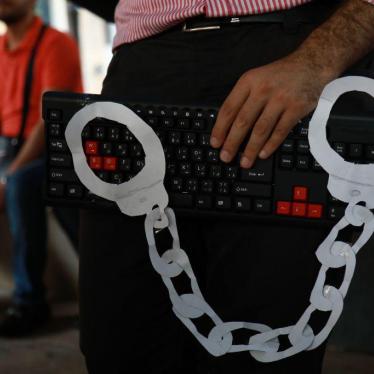(Beirut) – Lebanese journalists, media organizations, and civil society groups are facing the repeated use of criminal defamation charges and other vague legal provisions in response to their work alleging corruption and financial mismanagement in the country, Human Rights Watch said today. On April 10, Lebanon’s public prosecution summoned journalists from Daraj and Megaphone, two Lebanese media organizations, and the executive director of Kulluna Irada, an advocacy group, for investigative hearings on April 15. Security services previously summoned Daraj journalists in March for questioning.
“Lebanon’s recent political changes have not deterred authorities form clamping down on independent media and civil society organizations investigating and reporting on alleged financial misconduct and corruption,” said Adam Coogle, deputy Middle East director at Human Rights Watch. “Once again, we are witnessing the weaponization of criminal defamation laws and other dubious legal provisions in order to stifle attempts to shed light on years of financial malpractices.”
Lebanon’s new president and government, including the minister of information, as well as the current parliament should publicly commit to protecting the right to freedom of expression.
Since March 2025, Lebanon’s Anti-Cybercrime and Intellectual Property Rights Bureau, an Internal Security Forces unit tasked with combating cybercrime and enhancing online security, has twice summoned the editor-in-chief of Daraj following lawsuits over its investigations. Daraj’s lawyer told Human Rights Watch that documents he reviewed related to the lawsuits stated they were filed by Antoun Sehnaoui, the CEO of Lebanese bank Société Générale de Banque au Liban (SGBL). The lawsuits, which accuse Daraj of “defamation” and other vague charges, were filed following the media organization’s reporting on alleged financial malpractices by SGBL and the Lebanese banking sector more generally.
Media reports and Daraj’s lawyer say that Sehnaoui first filed a libel and defamation lawsuit against Daraj’s editor-in-chief, Hazem al-Amin, and journalist Jana Barakat in March 2024 in response to a 2023 investigative report on alleged financial malpractices by SGBL and Sehnaoui in the years leading up to and following Lebanon’s economic and financial crisis in 2019. Sehnaoui filed a second lawsuit against al-Amin, the lawyer said, on March 10, 2025, in relation to a video report commenting on Sehanoui’s initial lawsuit and al-Amin’s summons by the cybercrime bureau. Human Rights Watch sent a letter outlining its findings and posing questions to Antoun Sehnaoui on April 4 but has not received a response.
A third complaint, filed by three lawyers in March, accuses Daraj and Megaphone of “undermining the state’s financial standing and destabilizing confidence in the Lebanese currency and bonds,” “inciting depositors to withdraw their funds,” “stirring up strife,” “undermining the prestige of the state and national sentiment,” “assault and conspiracy against state security,” and “receiving foreign funding for media campaigns seeking to harm Lebanon.” On March 26, Lebanon’s top public prosecutor referred this complaint to the public prosecutor at the court of appeals.
On March 11, a separate group of lawyers filed a complaint against the Lebanese advocacy group Kulluna Irada, accusing the group of publishing false or exaggerated information “that seeks to weaken the morale of the nation,” “undermine the prestige of the state or its financial standing,” and “to cause a decline in the value of national banknotes or undermine confidence in the strength of the state’s currency, its bonds, and all other securities related to public financial confidence.” On March 25, Lebanese TV reported that Lebanon’s public prosecutor also had referred the complaint to the public prosecutor at the court of appeals.
Human Rights Watch has previously documented the Lebanese authorities’ increasing use of defamation and insult laws to silence journalists, activists, and others critical of government policies and corruption. Even if the judiciary is quick to dismiss such complaints, they are an intimidation tactic that can have a chilling effect on the media and lead to self-censorship, Human Rights Watch said.
As parliament debates a new media law, it should affirm Lebanon’s human rights obligations by repealing insult and defamation provisions in the penal code and replacing them with civil penalties. Parliament should ensure that the new media law meets international human rights standards, including by eliminating all charges and penalties based on peaceful speech, Human Rights Watch said.
In a 2019 report, Human Rights Watch found that the Cybercrimes Bureau had initiated 3,599 defamation investigations between January 2015 and May 2019. The numbers the bureau provided to Human Rights Watch at the time indicated a 325 percent increase in defamation cases for online speech between 2015 and 2018, coinciding with worsening economic conditions and public disillusionment in Lebanon.
In a joint statement in March, Lebanese media organizations, civil society groups, and parliament members condemned the ongoing campaign to silence media outlets and called on Lebanon’s Public Prosecution Offices to reject politically motivated investigations of journalists and civil society organizations.
Lebanon’s constitution guarantees freedom of expression “within the limits established by law,” but the penal code criminalizes defamation against public officials and authorizes imprisonment for up to one year.
“Without serious reforms, criminal defamation laws in Lebanon are easily exploited to stifle legitimate speech,” Coogle said. “As Lebanon’s government promises key financial, judicial, and social reforms, it should also work to strengthen freedom of expression protections afforded under Lebanese law.”








